Bertil Tungodden is no longer affiliated with CMI.
Publications
Journal Article | 2019
Ethnically Biased? Experimental Evidence from Kenya
Ethnicity has been shown to shape political, social, and economic behavior in Africa, but the underlying mechanisms remain contested. We utilize lab experiments to isolate one mechanism—an individual's bias in...
Lars Ivar Oppedal Berge, Kjetil Bjorvatn, Simon Galle, Edward Miguel, Daniel N. Posner, Bertil Tungodden, Kelly Zhang (2019)
in Journal of the European Economic Association vol. 18 no. 1
Journal Article | 2016
Effectiveness of a girls’ empowerment programme on early childbearing, marriage and school dropout among adolescent girls in rural Zambia: study protocol for a cluster randomized trial
Background: Adolescent pregnancies pose a risk to the young mothers and their babies. In Zambia, 35% of young girls in rural areas have given birth by the age of 18...
Ingvild Fossgard Sandøy, Mweetwa Mudenda, Joseph Zulu, Ecloss Munsaka, Astrid Blystad, Mpundu Makasa, Ottar Mæstad, Bertil Tungodden, Choolwe Jakobs, Linda Milimo Kampata, Knut Fylkesnes, Joar Svanemyr, Karen Marie Moland, Richard Banda, Patrick Musonda (2016)
in Trials vol. 17 no. 588 15 p.
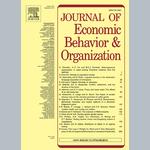
Journal Article | 2015
Disabled by stereotype? Experimental evidence from Uganda
More than one billion people in the world have some kind of disability. Apart from the obvious physical challenges facing disabled people, there may also be psychological barriers that make...
Kjetil Bjorvatn, Bertil Tungodden (2015)
in Journal of Economic Behaviour and Organization vol. 118 pp. 268-280

Journal Article | 2015
Human and financial capital for microenterprise development: Evidence from a field and lab experiment
Microenterprises constitute an important source of employment, and developing such enterprises is a key policy concern in most countries. But what is the most efficient tool for microenterprise development? We...
Lars Ivar Oppedal Berge, Kjetil Bjorvatn, Bertil Tungodden (2015)
in Management science vol. 61 no. 4 pp. 707-722

Journal Article | 2015
Competitive in the lab, successful in the field?
A number of lab experiments in recent years have analyzed people’s willingness to com-pete. But to what extent is competitive behavior in the lab associated with field choicesand outcomes? We...
Lars Ivar Oppedal Berge, Kjetil Bjorvatn, Armando Pires, Bertil Tungodden (2015)
in Journal of Economic Behavior and Organization vol. 118 pp. 303-317
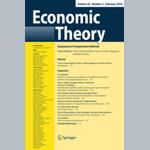
Journal Article | 2012
Sustainable recursive social welfare functions
What ethical criterion for intergenerational justice should be adopted, e.g., when faced with the task of managing the global environment? Koopmans' axiomatization of discounted utilitarianism is based on seemingly compelling...
Geir Bjarne Asheim, Tapan Mitra, Bertil Tungodden (2012)
in Economic Theory vol. 49 no. 2 pp. 267-292
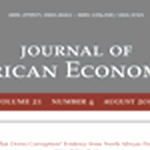
Journal Article | 2012
Business training in Tanzania: From research driven experiment to local implementation
Field experiments documenting positive treatment effects have a strong policy message: scale up! However, such experiments are typically implemented under close supervision of the research group in charge of the study. In contrast, scaling...
Lars Ivar Oppedal Berge, Kjetil Bjorvatn, Kartika Sari Juniwaty and Bertil Tungodden (2012)
in Journal of African Economies
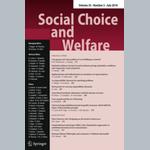
Journal Article | 2011
The importance of moral reflection and self-reported data in a dictator game with production
Alexander Wright Cappelen, Bertil Tungodden, Astri Drange Hole, Erik Øiolf Sørensen (2011)
in Social Choice and Welfare vol. 36 no. 1 pp. 105-120

Journal Article | 2011
Distributive interdependencies in liberal egalitarianism
Alexander Wright Cappelen, Bertil Tungodden (2011)
in Social Choice and Welfare vol. 36 no. 1 pp. 35-47
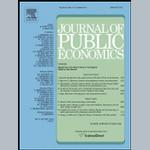
Journal Article | 2011
Measuring unfair (in)equality
Ingvild Almås, Jo Thori Lind, Alexander Wright Cappelen, Erik Øiolf Sørensen, Bertil Tungodden (2011)
in Journal of Public Economics vol. 95 no. 7-8 pp. 488-499
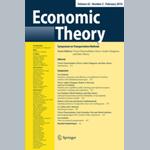
Journal Article | 2010
The tyranny of non-aggregation versus the tyranny of aggregation in social choices: a real dilemma
Can a trifle gain to sufficiently many well-off justify imposing a much larger sacrifice on the worst-off? We show that if one answers negatively to such a question, one is...
M. Fleurbaey and B. Tungodden (2010)
in Economic Theory vol. 44 no. 3 pp. 399-414

Journal Article | 2010
Fairness and the development of inequality acceptance
Fairness considerations fundamentally affect human behavior, but our understanding of the nature and development of people’s fairness preferences is limited. The dictator game has been the standard experimental design for...
Bertil Tungodden, I. Almas, A.W. Cappelen, E.O. Sorensen (2010)
in Science vol. 328 no. 5982 pp. 1176-1178
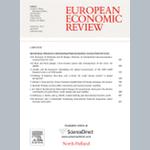
Journal Article | 2010
Responsibility for what? Fairness and individual responsibility
What should individuals be held responsible for? This is a fundamental question in much of the contemporary debate on distributive justice. Different fairness ideals, such as strict egalitarianism, and different...
Alexander W. Cappelen, Erik Ø. Sørensen and Bertil Tungodden (2010)
in European Economic Review vol. 54 no. 3 pp. 429-441
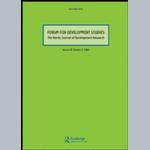
Journal Article | 2010
Demand for childhood vaccination - insights from behavioral economics
Childhood vaccination is a powerful tool for reducing morbidity and premature deaths, and vaccines are usually provided for free. Despite this, several low- and middle-income countries are lagging far behind...
Alexander Cappelen, Ottar Mæstad and Bertil Tungodden (2010)
in Forum for development studies vol. 37 no. 3 pp. 349-364

Journal Article | 2010
Teaching business in Tanzania: Evaluating participation and performance
There is increased awareness that success among small-scale entrepreneurs in developing countries requires more than microfinance, and that an important limiting factor for business growth is the level of human...
Kjetil Bjorvatn and Bertil Tungodden (2010)
in Journal of the European Economic Association vol. 8 no. 2-3 pp. 561-570
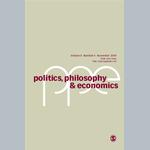
Journal Article | 2010
Disability compensation and responsibility
It is a central political goal to secure disabled individuals the same opportunities as others to pursue their conception of a good life. This goal reflects an ambition to combine...
Cappelen, Alexander W., Norheim, Ole Frithjof and Bertil Tungodden (2010)
in Politics Philosophy & Economics vol. 9 no. 4 pp. 411-427
Journal Article | 2009
Rewarding effort
Bertil Tungodden and Alexander Cappelen (2009)
in Economic Theory vol. 39 no. 3 pp. 425-441
Journal Article | 2007
The Pluralism of Fairness Ideals?
A core question in the contemporary debate on distributive justice is how to understand fairness in situations involving production. Important theories of distributive justice, such as strict egalitarianism, liberal egalitarianism,...
Bertil Tungodden, Alexander Cappelen, Astri D. Hole and Erik Ø. Sørensen (2007)
in American Economic Review vol. 97 no. 3 pp. 818-827
Journal Article | 2006
A Liberal Egalitarian Paradox
A liberal egalitarian theory of justice seeks to combine the values of equality, personal freedom, and personal responsibility. It is considered a much more promising position than strict egalitarianism, because...
Bertil Tungodden and Alexander Cappelen (2006)
in Economics and Philosophy vol. 22 no. 3 pp. 393-408
Journal Article | 2006
Relocating the Responsibility Cut: Should more Responsibility Imply Less Redistribution
Liberal egalitarian theories of justice argue that inequalities arising from non-responsibility factors should be eliminated, but that inequalities arising from responsibility factors should be accepted. This article discusses how the...
Bertil Tungodden and Alexander Cappelen (2006)
in Politics, Philosophy and Economics vol. 5 no. 3 pp. 353-362
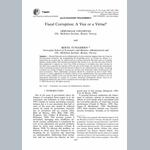
Journal Article | 2003
Fiscal corruption: A vice or virtue?
Recent literature on tax administration in poor countries suggests there are virtues of allowing fiscal corruption. By strengthening the bargaining power of corrupt tax officers, it is argued that tax...
Odd-Helge Fjeldstad and Bertil Tungodden (2003)
in World Development vol. 31 no. 8 pp. 1459-1467
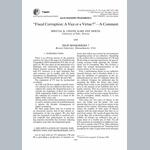
Journal Article | 2003
'Fiscal corruption: a vice or virtue': a reply
Odd-Helge Fjeldstad and Bertil Tungodden (2003)
in World Development vol. 31 no. 8 pp. 1473-1475
Journal Article | 2003
The value of equality
Bertil Tungodden (2003)
in Economics and philosophy vol. 19 no. 1 pp. 1-44
Journal Article | 2003
Reward and responsibility: How should we be affected when others change their effort?
Bertil Tungodden with Alexander Cappelen (2003)
in Philosophy, politics and economics vol. 2 no. 2 pp. 191-211
Journal Article | 2002
Responsibility and reward
Bertil Tungodden with Alexander Cappelen (2002)
in Finanzarchiv vol. 59 pp. 120-140
Journal Article | 2001
Justifying sustainability
Bertil Tungodden with G.B. Asheim and W. Bucholz (2001)
in Journal of environmental economics and management vol. 2 pp. 252-268
Journal Article | 2001
A balanced view of development as freedom
Bertil Tungodden (2001)
in Forum for development studies vol. 28 no. 2 pp. 241-261
Journal Article | 2000
Egalitarianism: Is leximin the only option?
Bertil Tungodden (2000)
in Economics and philosophy vol. 16 pp. 229-245
Journal Article | 1999
Rawlsian reasoning and the distribution problem
Bertil Tungodden (1999)
in Social choice and welfare vol. 16 pp. 599-614
Journal Article | 1999
Social choice theory
Bertil Tungodden (1999)
in Sosialøkonomen vol. 3 pp. 18-26

Edited Book | 2004
Toward pro-poor policies: Aid, institutions, and globalization
The Annual World Bank Conference on Development Economics (ABCDE) provides a forum for the world's leading development thinkers to share new knowledge and ideas. ABCDE - Europe 2003 presents selected...
Bertil Tungodden, Nicholas Stern and Ivar Kolstad (eds.) (2004)
Wash.D.C./Oxford: World Bank / Oxford Univ. Press 355 p.
Book Chapter | 2018
Reducing Early Pregnancy in Low-Income Countries
Early pregnancies are generally associated with negative effects on women’shealth and education (Goldin & Katz 2002; Rasul 2008), as well as theireconomic achievement (Bailey 2006; Miller 2010). Early pregnancies arealso...
Lars Ivar Oppedal Berge, Kjetil Bjorvatn, Amina Mohamed Maalim, Vincent Somville, Bertil Tungodden (2018)
in Siwan Anderson, Lori Beaman, and Jean-Philippe Platteau: Towards Gender Equity in Development. Oxford: Oxford University Press pp. 141-166
Book Chapter | 2007
Redistribution and Marginal Productivity Reward
Bertil Tungodden and Alexander Cappelen (2007)
in Peter J. Lambert (Ed.): Equity. Elsevier-bookseries: Research on Economic Inequality, Vol.15 pp. 1-6
Book Chapter | 2006
Who are the Least Advantaged
The difference principle, introduced by Rawls (1971, 1993), is generally interpreted as leximin, but this is not how he intended it. Rawls explicitly states that the difference principle requires that...
Bertil Tungodden and Peter Vallentyne (2006)
in Nils Holtug and Kaspert Lippert-Rasmussen, eds.: Egalitarianism: New Essays on the Nature and Value of Equality. Oxford: Oxford Univ. Press pp. 174-196
Book Chapter | 2005
A Balanced View of Development as Freedom
Bertil Tungodden (2005)
in Ivar Kolstad and Hugo Stokke, eds.: Writing Rights: Human Rights Research at the Chr.Michelsen Institute 1984-2004. Bergen: Fagbokforlaget pp. 79-97
Report in External Series | 2005
The Pluralism of Fairness Ideals: An Experimental Approach
Alexander W. Cappelen, Astri D. Hole, Erik Ø. Sørensen and Bertil Tungodden (2005)
Bergen: Department of Economics. Norwegian School of Economics & Business Administration (Discussion Paper 12/05) 27 p.
Commissioned Report | 2002
A Rights-based approach to (Norwegian) development assistance. A discussion paper commissioned by the Royal Norwegian Ministry of Foreign Affairs
Tone Bleie, Siri Gloppen, Alf Morten Jerve, Hugo Stokke and Bertil tungodden (2002)
Bergen: Chr. Michelsen Institute 24 p.
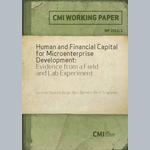
CMI Working Paper | 2011
Human and financial capital for microenterprise development: Evidence from a field and lab experiment
Which is the most binding constraint to microenterprise development, human capital or financial capital? To answer this question, we present the first field experiment that jointly investigates these two constraints...
Lars Ivar Oppedal Berge, Kjetil Bjorvatn, Bertil Tungodden (2011)
Bergen: Chr. Michelsen Institute (CMI Working Paper WP 2011: 1) 51 p.

CMI Working Paper | 2009
Teaching business in Tanzania: Evaluating participation and performance
There is increased awareness that success among small scale entrepreneurs in developing countries requires more than microfinance, and that an important limiting factor for business growth is the level of...
Kjetil Bjorvatn and Bertil Tungodden (2009)
Bergen: Chr. Michelsen Institute (CMI Working Paper WP 2009: 9) 9 p.
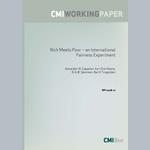
CMI Working Paper | 2008
Rich Meets Poor - an International Fairness Experiment
Why do people in rich countries not transfer more of their income to people in the world's poorest countries? To study this question and the relative importance of needs, entitlements,...
Alexander W. Cappelen, Karl Ove Moene, Erik Ø. Sørensen, Bertil Tungodden (2008)
Bergen: Chr. Michelsen Institute (CMI Working Paper WP 2008: 10) 29 p.
CMI Working Paper | 2005
How Middle-men can Undermine Anti-corruption Reforms
The anti-corruption reform in the Tanzanian tax bureaucracy in the mid-1990s was apparently a short-lived success. In the wake of the reform, a number of "tax experts" established themselves in...
Kjetil Bjorvatn, Gaute Torsvik and Bertil Tungodden (2005)
Bergen: Chr. Michelsen Institute (CMI Working Paper WP 2005: 1) 28 p.
CMI Working Paper | 2001
Fiscal corruption: A vice or a virtue?
Recent literature on tax administration in poor countries suggests that inducing more fiscal corruption may contribute to reducing tax evasion and increasing tax revenues. But does such an intriguing paradox...
Odd-Helge Fjeldstad and Bertil Tungodden (2001)
Bergen: Chr. Michelsen Institute (CMI Working Paper WP 2001:13) 12 p.
CMI Working Paper | 2001
A balanced view of development as freedom
Amartya Sen, in his most recent book Development as Freedom, argues that expansion of human freedom should both be viewed as the primary end and the principle means of development....
Bertil Tungodden (2001)
Bergen: Chr. Michelsen Institute (CMI Working Paper WP 2001:14) 22 p.

CMI Brief | 2016
Not so great expectations: Gas revenue, corruption and willingness to pay tax in Tanzania
Huge reservoirs of natural gas have been discovered offshore the southern coast of Tanzania. There are high expectations that exploitation of natural resources will substantially increase Tanzania’s national income. This...
Alexander Wright Cappelen, Odd-Helge Fjeldstad, Cornel Jahari, Donald Mmari, Ingrid Hoem Sjursen, Bertil Tungodden (2016)
Bergen: Chr. Michelsen Institute (CMI Brief vol. 15 no. 4) 4 p.
Journal Article | 2001
Korrupsjon og skatteunndragelse i Tanzania: En studie av Tanzania Revenue Authority
Odd-Helge Fjeldstad and Bertil Tungodden (2001)
in Den Ny Verden vol. 34 no. 3 pp. 55-78
Conference Paper / Presentation | 2013
Girl's Economic Empowerment: a randomized experiment in Tanzanian schools
Lars Ivar O. Berge, Kjetil Bjorvatn, Tausi Kida, Linda Sekei, Vincent Somville, Bertil Tungodden (2013)
Presented at: NHH - Symposium on Economic Experiments in Developing Countries 2013
Projects
RISE - Research Initiative to Support the Empowerment of girls
Aug 2014 - Dec 2022
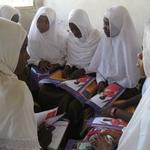
Girl Power - Economic Empowerment in Tanzania
Jan 2013 - Dec 2014
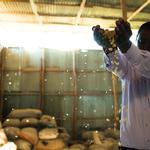
On the mechanics of microfinance
Jan 2011 - Dec 2014
Bergen Seminar 2005: Unleashing Capacities to Achieve the MDGs
Apr 2005 - Jul 2005
ABCDE conference proceedings: Development economics
Jan 2003 - Jun 2003